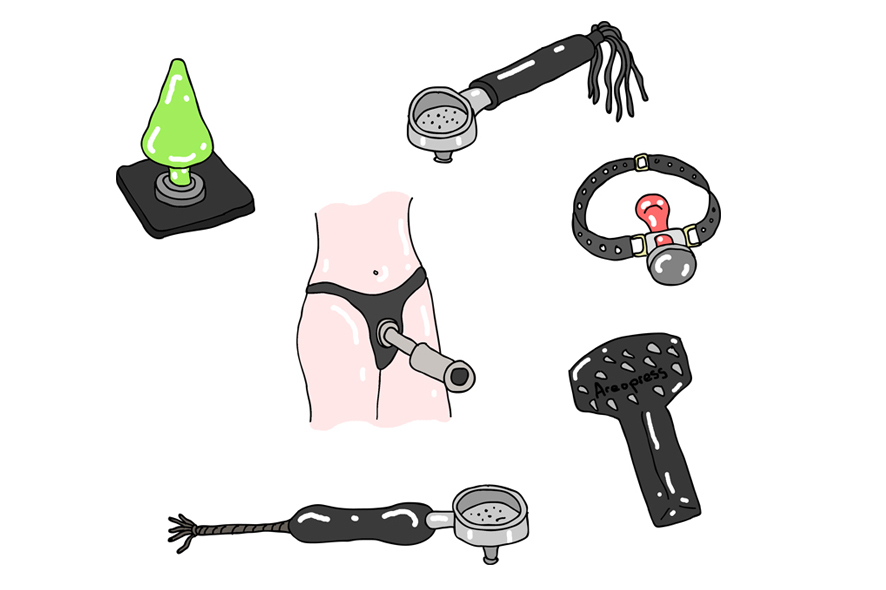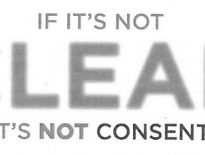Things You Should Know! BDSM and Your Sexual Health by Papa-Bear
We in the Kink Community are often over looked when it comes to STI and Sexual Health outreach. It’s partly the “Old Guard’s” fault. They were, as a general rule, practicing safely. They coined the phrase “Safe, Sane and Consensual” and many lived by it. This, whether it be true or not, has lead to the kink community being over looked and not to be considered at risk by many. However, new trends are developing, and people are finding kink in new ways (thanks internet and erotic literature). We have so many more people jumping in but they aren’t getting the same education they once did. Though even for the Old Guard, finding stigma free medical care was an issue.
What STIs should we be aware of?
 – HIV: Human Immunodeficiency Virus. There is no cure, but treatment has come a long way. With proper medications a person can become undetectable and will not transmit the virus. Did you read that?! Yes! If a person is HIV positive and taking their medications regularly they can develop an undetectable status and they WILL NOT transmit the virus! Untreated, HIV can develop into AIDS and is life threatening. That’s why regular testing is so important.
– HIV: Human Immunodeficiency Virus. There is no cure, but treatment has come a long way. With proper medications a person can become undetectable and will not transmit the virus. Did you read that?! Yes! If a person is HIV positive and taking their medications regularly they can develop an undetectable status and they WILL NOT transmit the virus! Untreated, HIV can develop into AIDS and is life threatening. That’s why regular testing is so important.
– Hepatitis A: Viral liver disease can cause mild to severe illness, most recover fully with a lifelong immunity. There is a vaccine! Get it! Seriously, it’s one less thing to worry about. There is no medical cure, but people generally naturally recover, but it isn’t a fun time.
– Hepatitis B: Viral liver disease can cause acute and chronic illness. There is a vaccine for this one too! It can be treated and suppressed but not cured.
– Hepatitis C: Viral liver disease can cause chronic and lifelong serious illness. There is NO vaccine. There is treatment though it is expensive and still being fine-tuned.
– HPV: Almost everyone will get HPV at some point in their sexual lives. There are many different types of HPV and a handful of them can cause cancer. You can be vaccinated for the cancer causing strains of HPV, and the vaccine is generally free if you’re under 26 years old. Both men and women can have issues with cancer from HPV. Should people over 26 get vaccinated? Your doctor might not think so, but my thoughts are, “sure you’ve been exposed, but why not get vaccinated from the cancer causing ones since there’s still a chance that you weren’t exposed to them yet. Your insurance won’t cover it, but it’s not break the bank expensive.
– Gonorrhea: Can cause men to go sterile, and there can lead to other health issues for men and women, and can even be life threatening if untreated. You can get it more than once. (drug resistance is starting to become an issue)
– Chlamydia: Can cause problems with women’s reproductive abilities, you can get it more than once, you can have it and not show symptoms. It’s not fun for men either.
– Syphilis: Can cause major health issues if left untreated and can be fatal if left untreated.
Things not to worry too much about:
– HSV 1 and 2 (Herpes): 80% of people have either HSV 1 or 2. The first outbreak will generally suck, but following outbreaks are less annoying. They don’t kill you. People can have HSV and never know, never showing symptoms yet can still pass them on. There is medication that can help prevent outbreaks and decrease risk of transmission. Did I mention they don’t kill you and 80% of people have Herpes? Most just don’t know it. Coldsores are Oral Herpes, but don’t generally get the same stigma as Genital Herpes do. That’s because Oral Herpes probably came from sharing a glass of lemonade with Grandma, and Genital Herpes came from sex. Fuck that Stigma, neither of them are a big deal, and I’d rather have sex then share a lemonade!
Side note, you can get HSV 1 orally and genitally and you can get HSV 2 orally and genitally. That’s another reason why I don’t really differentiate.
Toys, Equipment and Play:
 Shared penetrative toys
Shared penetrative toys
- Need to be cleaned every time and ideally used with a condom. Larger toys, try a female condom!
- Lube should be used. It helps prevent tears.
- Do not use a large shared container of lube like Crisco for all partners. If you’re anally fisting multiple people per month, dedicate their own Crisco containers!
- Make sure the lube is safe for your toys and condoms (no oil based lube with condoms)
Non-penetrative toys
- Do they break skin?
- Do they come in contact with body fluids?
If so, be sure to clean them every time or don’t share them if you can’t.
Cutting and Needle Play
- Sharing needles (Hep C and HIV concerns) Are you using new needles every time? Can they be sterilized?
- Knives (have they been sterilized, not just washed)
- Wearing gloves and practicing universal precautions is a good idea.
- Cleaning up your area when you’re done is a must!
- No walking around the dungeon when you’re bleeding.
- Sharps disposal, does your dungeon have one? Is there a place in your city you can safely dispose of sharps? Your garbage person doesn’t want Hep C either.
Homemade Toys or “You Put What Where?!”
- Figging and other insertables. Make sure they won’t get sucked into the anus or vagina.
- Can they be cleaned? If not, they should not be shared and disposed of after play.
- Rough or sharp edges can cause cuts and infections and increase risk of HIV, Hep B and Hep C
Anal play
- Including rimming
- ATM (Ass to Mouth)
- And scat play
 Increase the risk of and Hepatitis A. You can get vaccinated for these, and I recommend it! Insertive anal play can cause micro tears that increase the risk of HIV and Hepatitis B and Hepatitis C if the rectum is exposed to body fluids (not spit or urine).
Increase the risk of and Hepatitis A. You can get vaccinated for these, and I recommend it! Insertive anal play can cause micro tears that increase the risk of HIV and Hepatitis B and Hepatitis C if the rectum is exposed to body fluids (not spit or urine).
Fluid Exchange
- Any play that involves exchange or contact with the four fluids increases your risk of HIV.
- Oral sex increases risks of Gonorrhea, Chlamydia, Syphilis, and HPV (there is a risk of HIV but it is very small)
The Four Fluids - YOU CANNOT GET HIV FROM SPIT OR PEE!
- The 4 fluids are Semen, Breast Milk, Blood, and vaginal fluid (Some places also list rectal secretions, but really it’s the small amount of blood in the micro tears in the anus, so it fits under “blood”)
Finding a doctor
– Do some research! There are Kink aware doctors out there, but they won’t generally be easy to find. LGBTQ doctors tend to be more accepting and/or knowledgeable and a great place to start. They can also often make referrals to another doctor that is BDSM friendly if they themselves aren’t.
– Go in confident and unapologetically proud when you tell then that you are into BDSM or kinky things. Let them know this is part of your sexuality and/or sexual identity.
– Know that you can “fire” your doctor. If you feel stigmatised or judged, it is your right to find a new provider.
– Doctors are mandatory reporters and some BDSM looks like abuse to them. It is important to let them know that these were consensual sexual acts of BDSM or Kink. Again, do it with confidence and have no shame.
– Your doctor might not be in the scene, but I bet they read 50 Shades of Grey. It’s up to all of us to stop misconceptions. Your doctor may not know what questions to ask, or be familiar with your particular kink. Let them know it’s ok to ask you questions about what you’re doing so they can better serve you as your clinician.
– Know that you are not alone, and you are not the only kinky person out there. We deserve healthcare just like anyone else.
– Most insurance plans will cover 1 or 2 STI testings a year. Saying you’ve had an exposure may be the magic words to make sure they’re covered too. If you feel you’re at a higher risk, you should be getting tested every three months. You might have to find your local free STI testing site to offset some costs.
 Kink and BDSM under the influence of Drugs or Alcohol
Kink and BDSM under the influence of Drugs or Alcohol
- Are you capable of consenting; is the other person/people capable of consenting?
- Do you push your limits further than you would want to, or is safe for you, if you were sober? Does your partner?
- Reduced Reaction speed might be a problem with some forms of play.
- Sharing needles for drugs (just like in play) is a higher risk of spreading HIV and/or Hepatitis C.
- Also note that most dungeons will not let you in if you are noticeably intoxicated or high.
 Negotiations are so important!
Negotiations are so important!
Have STI conversations, they should be part of negotiations. Most people want to talk about them, so be the person to bring them up. If someone gets defensive, that’s generally a red flag.
When were you last tested?
- What were the results?
- These are the STIs I have, do you have any?
- Are you Monogomous, Polyamorous or in an open relationship?
- Are you in a closed circle or house?
- When were your other partners last tested?
- Are you fluid bound?
- What kind of protection do you use with other partners?
- Do you use new or sterile needles?
- What fluids are you willing to come in contact with if any?
- What kind of protection do you want used?
- Will there be any skin to skin contact involving genitals?
PrEP
Did you know there is a pill that when taken once a day (preferably at the same time everyday) it prevents HIV by up to 99% ?! It’s called PrEP, or Truvada if you prefer medical terms. Google it. Tell your friends about it, and tell them to tell their friends about it!
This is not a complete list, but it’s a great start. Talk to your partners, and talk to your healthcare providers. It’s your body and your right.
By _Papa-Bear_

 Shared penetrative toys
Shared penetrative toys Kink and BDSM under the influence of Drugs or Alcohol
Kink and BDSM under the influence of Drugs or Alcohol Negotiations are so important!
Negotiations are so important!




